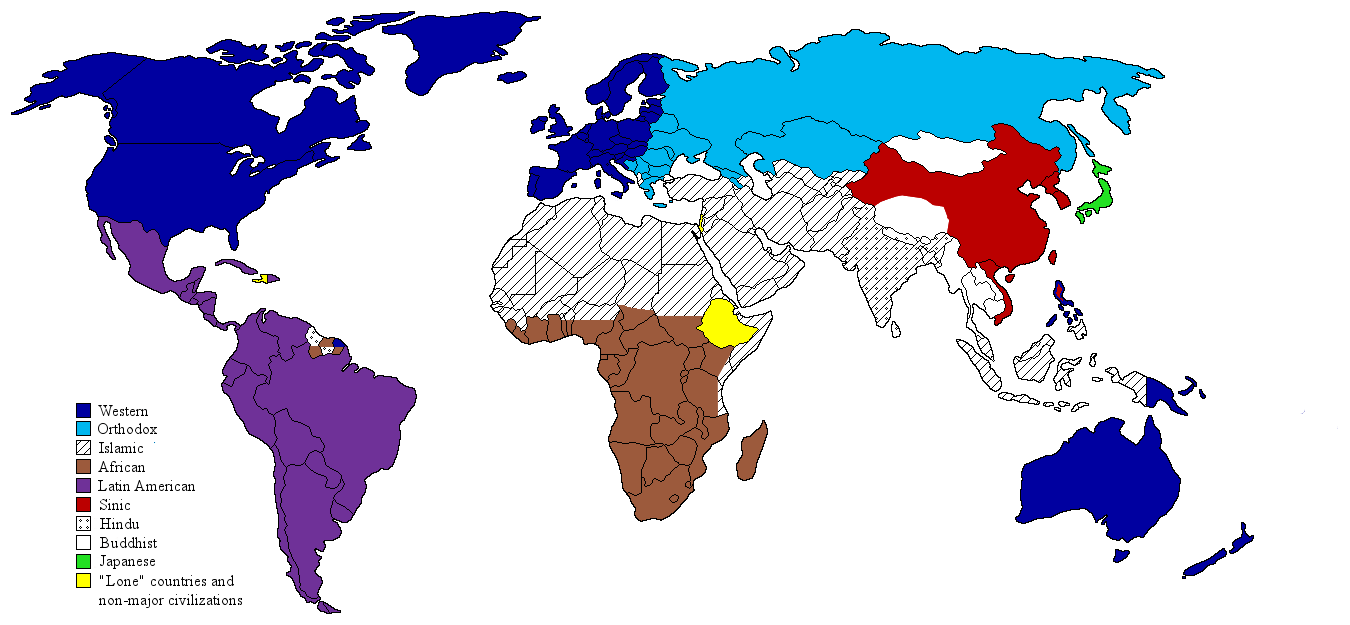Samuel P. Huntington, The Clash of Civilizations?, Foreign Affairs, Summer 1993, pp. 22-49
This article set off a debate in academia that continues to this day. What Huntington argues in the paper is that after the fall of communism in 1989, the world is no longer looking at a standoff between ideologies but that the world will revert to clashes between civilizations. The basic thesis is that the ideological struggle between liberal democracy and communism covered over or subsumed the natural differences between civilizations. He argues that prior to the end of the Cold War the conflicts that shaped history were primarily Western and have gone through three phases since the signing of the Peace of Westphalia in 1648 created the modern nation-state system. These three phases he calls conflict between princes, nation-states, and finally ideology. With the end of the Cold War though, the nature of conflict has moved beyond the West and now encompasses the entire globe. He organizes the world into nine civilizations: Western, Orthodox, Islamic, African, Latin American, Sinic (Chinese), Hindu, Buddhist, Japanese with Haiti and Ethiopia not fitting into any of the major civilizations.

Huntington’s article was published in 1993 only a few short years after the Cold War ended and despite naysayers, I would argue that the articles has proved remarkably prophetic particularly with regards to his anticipation that Islam would be a major actor in provoking clashes. This quote is particularly apt.:
This centuries-old military interaction between the West and Islam is unlikely to decline. It could become more virulent. The Gulf War left some Arabs feeling proud that Saddam Hussein had attacked Israel and stood up to the West. It also left many feeling humiliated and resentful of the West’s military presence in the Persian Gulf, the West’s overwhelming military dominance, and their apparent inability to shape their own destiny. Many Arab countries, in addition to the oil exporters, are reaching levels of economic and social development where autocratic forms of government become inappropriate and efforts to introduce democracy become stronger. Some openings in Arab political systems have already occurred. The principal beneficiaries of these openings have been Islamist movements. In the Arab world, in short, Western democracy strengthens anti-Western political forces. This may be a passing phenomenon, but it surely complicates relations between Islamic countries and the West.
He wrote not knowing that 9/11 would occur or that radical Islam would enjoy a renaissance throughout the Arab world. Yet he has called it nonetheless. This seems especially important given the ongoing unrest in the Arab world. What will the future shape of Islamic civilization look like? They certainly have many problems to overcome and it appears that radical Islam is more interested in scapegoating the West or Israel than actually getting down to the business of solving problems. This has been a common reaction of regimes throughout history, so common in fact that the term flag-waving was coined for it. It is easy to attack and blame the “other” to distract the people from domestic failures.
The focus of the article is not to peer into a crystal ball though. Rather, it is to draw Western policy maker’s attention to potential issues they should be aware of. I just find it amazing that he so correctly predicted the areas of future conflict. Needless to say, this is a good article to anyone interested in a workable theory as to why some of the conflicts of the post-Cold War world are happening.
Huntington does have his detractors though. The most recent I have seen appeared in the New York Times earlier this week: Huntington’s Clash Revisited. Although refutations of his hypotheses have appeared from time to time since the publication of the original article, none have adequately addressed refuted Huntington’s original hypotheses to any great degree. Most refutations seem to object to his model on some type of moral ground and not on its essential correctness. Some of these refutations are here.
Edward Said, The Clash of Ignorance
Sylo Taraku, Are “civilizations” in collision?
Seizaburo Sato, The Clash of Civilizations: A View from Japan
Engin I. Erdem, The ‘Clash of Civilizations’: Revisited after September 11, It is probably no mistake that this paper comes out of Turkey and is the most insightful analysis of Huntington I have found. The Turks I have met and spoken to are some of the most clear thinking people I have ever met. Generally so are Austrians as well. Perhaps it has something to do with once having had a long-lived empire only to lose it.
